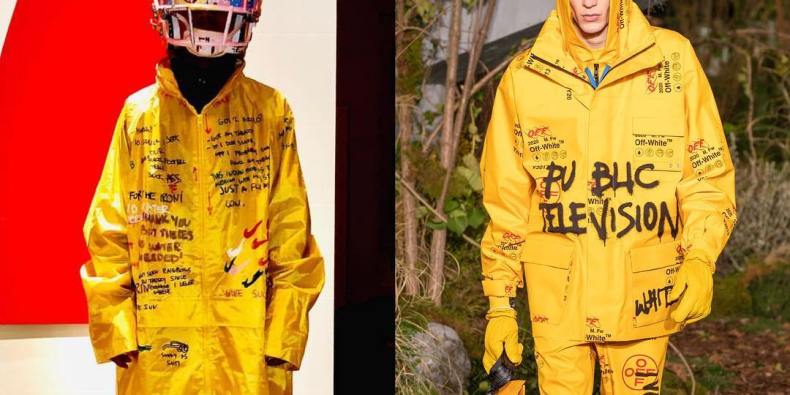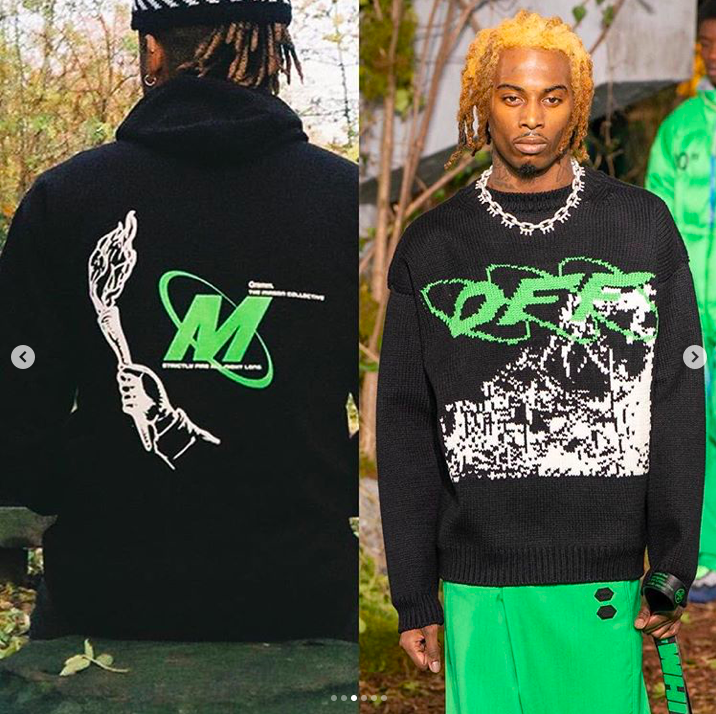Virgil Abloh, artistic director of menswear at Louis Vuitton and CEO of luxury fashion label Off-White, has faced multiple plagiarism and appropriation allegations throughout his decade long career. In January 2019, fashion watchdog Diet Prada accused Abloh of directly stealing the designs of a young designer, Punk Zec. Punk Zec’s mother, who happens to be an industry insider, Michelle Elie, published an Instagram post comparing her son’s designs with Abloh’s, and even details that her son had met Abloh himself at Abloh’s first presentation in Paris.
The designs do bear striking similarities. Both Abloh and Zec’s designs involve a yellow raincoat and matching pants adorned with graffiti-like writing all over. The other design that is claimed to have been plagiarized is of a black sweatshirt with green writing surrounded by a green orbit accompanied with white drawings. While the word and drawing are different, it appears to be the same shade of green.
In response, Abloh claims, “Streetwear in my mind is linked to Duchamp. It’s this idea of the readymade. I’m talking Lower East Side, New York. It’s like hip-hop. It’s sampling. I take James Brown, I chop it up, I make a new song. … . It’s streetwear 10.0–the logic that you can reference an object or reference a brand or reference something. It’s Warhol––Marilyn Monroe or Campbell’s soup cans.” Despite admitting that his work is referential in nature, Abloh maintains that the similarities between his and Punk Zec’s work are mere coincidence, and that he had never seen the young designer’s work before.
More recently, Walter Van Beirendonck, head of the fashion department at the Royal Academy of Fine Arts Antwerp and veteran Belgian designer, has accused Abloh of stealing his Fall 2016 designs and using them in his designs for the Louis Vuitton men’s spring 2021 line. On August 7th, Van Beirendonck took to Instagram to compare his and Abloh’s designs. Both design featured men’s suits in primary colors with a figurine sewed to the front of the jacket. The day before this, Van Beirendonck posted an image of a t-shirt with the words “I HATE FASHION COPYCATS” emblazoned on it.
Van Beirendonck acquiesces that “Copying is nothing new. It’s part of fashion.” However, he qualifies this statement with the following: “But not like this. Not on that level, with their budgets, their teams, their possibilities,” referring to Louis Vuitton’s estimated $32 billion value. Van Beirendonck then attacks Abloh personally, stating “It’s very clear that Virgil Abloh is not a designer. He has no language of his own, no vision. He can’t create something of his own season after season and that is painful.”
In response, Abloh asserts that “Walter Van Beirendonck’s claims are completely false. They are a hate-filled attempt to discredit my work. The inspiration for my collection comes from the DNA of Louis Vuitton, specifically the 2005 Louis Vuitton menswear show, and it was clearly outlined in the notes distributed to the press when the show began. This is yet another instance of false equivalence to try to discredit me as a designer.”
Despite having a plausible case, at least in France, where the intellectual property laws regarding fashion copyright are more broad, Van Beirendonck has not filed a suit against Abloh.
To expand on the fashion industry’s perception of Abloh, Susan Scafidi, president of the Fashion Law Institute at Fordham Law School, notes that “There is a little bit of snobbery about the fact that Virgil didn’t train as a designer and ‘pay his dues’ to the industry in that way.” Abloh holds degrees in civil engineering and architecture. It is also worth noting that Kanye West, a longtime collaborator of Abloh’s, claims that there is a racial aspect to the fashion industry’s rejection of Abloh.
Despite the many plagiarism allegations out against Abloh, he maintains his 3 percent philosophy, which is to take something that is existing and turn it into something new by altering it as little as 3 percent. Put this way, it seems as though Abloh’s philosophy is somewhat inspired by the artistic practice of detournement.










